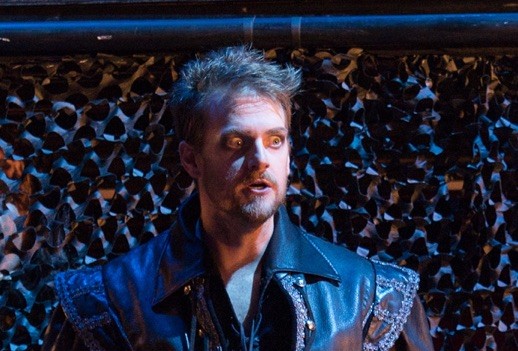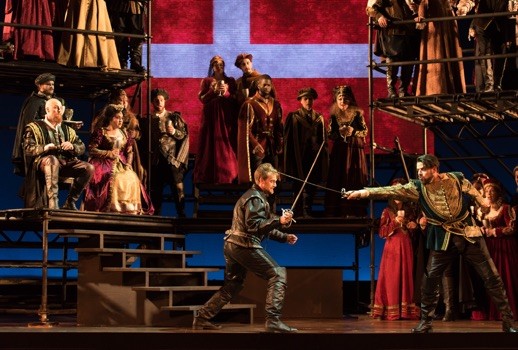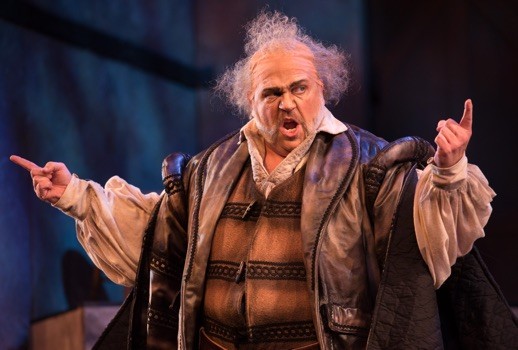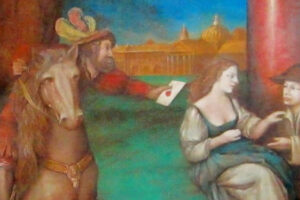

I don’t know which to discuss first: this fascinating score itself or its astonishing East Coast stage premiere in Wilmington last Saturday. (Two dates of the run remain.) I expected to enjoy Amleto, having admired the score in its Baltimore concert performance a year and a half ago, and as broadcast, fully orchestrated, from Opera Southwest; I wasn’t expecting to be knocked out by the performance. And I’d like to hear it again, and these singers again.
OperaDelaware is a small, ambitious company determined to be noticed—and innovative, attractive repertory can cast a wide net. Their May Festival pairs the unknown but tragic Amleto with the wit of Verdi’s Falstaff, a company premiere. The stagings are imaginative and vivid, the singers eager and able, the performances provincial only in locale. This is the way to put yourself on the operatic map—not just another Carmen or Traviata. But Amleto!
My guess is that you are aware of Hamlet. You’ve read it, or seen a movie. You can quote it. It’s a familiar brand. So if somebody sets it to music (many have), you’ll attend with expectations at the ready. You’ll expect a broody prince and an angry ghost, a play-within-a-play (terrific concertato finale before the intermission), a drowning, a sword fight, mayhem, soliloquies, blood. Lots of blood. You may or may not expect riveting music-theater or an opera dramatically tighter than the play it’s taken from. I was at the edge of my seat during the climactic scenes that constitute Act IV (the graveyard and the duel), stunned by the beauty of Ofelia’s Funeral March and wondering, through the swordplay, how it would all come out. Although, as I say, I’d seen it before.
Faccio was twenty-four years old in 1865 when he collaborated on Amleto with Arrigo Boito, twenty-three. They were part of the crowd eager to take Italian opera to the post-Verdi level. Verdi (revising Macbeth and beginning Don Carlos), was miffed; at fifty, he didn’t think he was through—and we know he wasn’t. (Falstaff showed up in 1893.) But young folks have to invent. Amleto is new, though the Ghost of Verdi stalks through some of the murkier scenes, recalling Sparafucile in Rigoletto’s Mantua in the tinta of Elsinore’s foggy ramparts, and some of the bigger tunes hark to French grand opera. (Ambrose Thomas’ Hamlet premiered in Paris in 1868.)
Boito and Faccio turned many of the speeches into arioso declamation over a light orchestration rather than forcing the material into “numbers.” This was, indeed, one of the directions new opera was going, as we know from many later works, but audiences weren’t quite ready for it. Faccio turned more of the verse to melody by the time of the 1871 revival at La Scala, which nonetheless, especially the enormous title role, demanded singers of unusual dramatic intensity and endurance. Tragically (for Faccio and for us), the only tenor who knew the title part was ill; he went on anyway, and the show suffered. The composer’s nerves did not risk another run. The rest of his life was devoted to conducting such occasions as the first Otello and the first Italian Lohengrin. Then he went mad.
That is why Amleto never entered the repertory: It lay in the archives until unearthed by conductor and musicologist Anthony Barrese, struck by the notion that Boito had created a Hamlet for Faccio long before he wrote Otello and Falstaff for Verdi. What could it be like? No one knew. The score was in tatters, microfilm and manuscript. Barrese, who heads Opera Southwest, spent years putting it together, getting people interested, even rewriting it a bit. He conducted it in Albuquerque and in Wilmington (Bregenz has expressed interest); the small but able OperaDelaware orchestra played with enthusiasm and finesse. The chorus sounded twice its size.

The costumes were Renaissance in style, luxurious textures and colors, creating scenic effects against the spare set. The director, E. Loren Meeker, though skillful at deploying his forces, resorts rather too often to inane clichés in characterizing individuals. Laerte need not wave a wine bottle to demonstrate his merry disposition; the music does that. We know the Ghost was a king; he need not wear an ermine robe when Amleto, who can see him, describes him as wearing armor. And the ermine caught on the furniture.
The title role of Amleto is long and grueling. Not “heroic” in the sense of Otello—he doesn’t have to battle through Verdi’s skirling brasses—but the great speeches are here and the great confrontations (Ghost, Ofelia, Geltrude). Power must be sustained and beauty not forfeited. Too, unlike Verdi or Wagner but rather like Bellini, Faccio offers no place for a singer to hide, to duck behind the orchestra for a breather. The voice is out there, declaiming and acting, sometimes with only a few plucked strings to keep it on the proper notes. Joshua Kohl gave a star-making performance, tireless to the last, intimate and passionate. He bounded about the set in Amleto’s “antic” moods, with lyric, wooing phrases for his duets, and he’s slim and easy on the eyes.
Sarah Asmar, his Ofelia, has sung Verdi’s Desdemona, which is easy to believe. She has a sustained pastel quality, quietly filling a theater without shrieking for attention. The beauty of line was what kept you attentive, and the melancholy of her Mad Scene, which was not without coloratura (perfectly executed) but was not the endless frilly extravagance Ambrose Thomas created for Christine Nilsson in Paris. We all love that silly scene, but Faccio’s version was poetry, integral to the play and the character.
Lara Tillotson sang the mezzo Geltrude, and had some heavy weather with her aria of guilt and regret. The queen must express love for her son and for her new husband, and this conflict was not clear, whether due to Faccio’s inattention or Tillotson’s distraction, but she more than held her own in the great trio with Amleto and the Ghost. Ben Wager cut a tall if not very spooky figure as that Ghost but his dark bass had more fun with the role of Luciano in the Gonzago play.
Timothy Mix’s Claudio was rather too merry a monarch; he could have done with more saturnine dignity—this was the one interpretation I thought better in the Baltimore performance. True, Faccio sticks him with some unrelieved arioso in the chapel scene, but Mix sang it more drily than he needs to, and his whole attitude seemed a bit youthful for the role. Matthew Vickers sang Laerte effectively and dueled like a maniac, which was good because so did Kohl and one of them was going to get cut. Both, actually. (Fight choreographer is the new title and well earned: Lewis Shaw.)
Harold Wilson sang Polonio, barely noticeable in this version of the tale, and also the Gravedigger, who gets a song and a star turn that delighted everyone up for comic relief in the long, tense final act. José Sacin was impressive whenever he sang during the small role of Marcello.

Falstaff was just a bit scrappy. The score, of course, is a conductor’s and an orchestra’s dream, and we have all heard the best take it on, but the small-size Delaware band (the pit of the house does not permit a huge one) played it gamely, and conductor Giovanni Reggioli held it to the proper marks. The singers, who had all of two rehearsals with orchestra I’m told, were amazingly tight, their slapstick precise and funny. The laughter ran all afternoon. Dean Anthony’s direction did not overdo moments like Falstaff emerging from a tight door and a tiny page boy appearing, wiping his brow, in the open doorway in his wake. The unit set was realistically Tudor so that one did not have to think about it.
I enjoyed the purse-lipped Quickly of Ann McMahon Quintero, though the voice sometimes faded under orchestral onslaught, and I liked the deep, womanly murmurs of Victoria Cannizzo’s Alice. Both Sharon Apostolou’s Nannetta and Ryan MacPherson’s Fenton seemed oversized for their light, lyric roles; that is, they should have been singing Rodolfo and Mimi, or even Cavaradossi and Tosca. I wanted more delicacy for some of Verdi’s most exquisite music.
The two big male roles were superbly cast. Steven Condy played an old-fashioned Falstaff, narcissistic and convincing in his inability to believe himself a fool, with fine diction, fine bursts of buffo and a bellyful of swagger. He was always “on.” Va, vecchio John, indeed. His foil is the humorless Ford—nothing is funnier than the humorless in duet with hilarity—and Sean Anderson sang a most winning Ford, full-throated and masterful, acted to the tip but sung with gracious power. Jeremy Blossey and Matthew Curran were just right as Falstaff’s boozy comrades; Jeffrey Halili kind of overdid Dr. Caius’ nose.
But as I say, I want to hear Amleto again. I’ll be very surprised if I don’t get the opportunity. Singers will want to take it on, audiences will want to hear it.
Photos: Joe del Tufo, Moonloop Photography























Comments